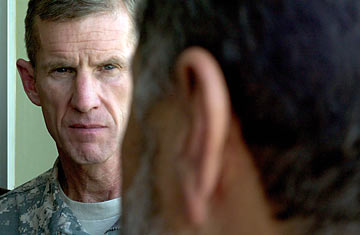
Following the murder of the chief of police and an outbreak of fighting by insurgents in the city's streets, General Stanley McChrystal, newly appointed head of forces in Afghanistan, is briefed by an Afghan National Army commander at a base in Kandahar
(4 of 7)
The 1994 incident ... [McChrystal was a lieut. colonel with the 82nd Airborne Division when a flaming F-16 jet plowed into a parked C-141 at Pope Air Force Base, North Carolina, killing 18 of his troops as they prepared for parachute jumps. This mention in the interview was accompanied by an instant change in tone. He went from animated to muted, and there was a long silence of nine seconds.]
I had been in command for almost a year ... We had just finished a joint readiness training, where you build up a team. What we had done, we had a year of team-building in preparation for that event. Very quickly after that, we had the accident, which was completely unexpected. Not only did we lose so many killed, but a tremendous number who were badly injured, and so even those who died, didn't do it that minute but over time — one almost a year [later]. Most of them were burn wounds. What that did for me was, first off, you watch your soldiers who had just died, and you watch your soldiers die over a period of time, and you watch those who are significantly permanently injured — amputees, the horrific impact of burns — but what I took away from that was the importance of the team.
What happened right there was that the team came together. They all came together in this sense of, we are going to take care of each other. We sent our own paratroopers to bury each of our own killed. What I took away from that was, as you are going to do anything difficult, as you are going to steel yourself for anything that is going to be hard, you build that team first. You can't prepare for an accident. What you prepare is the people in the team and the trust between them, and that will then withstand even the unexpected. I have the same thought process now.
And how does it help you relate to air-strike victims?
Because you affect several different populations if you make a mistake like that. First you affect one village, and you have got to first think, What is the impact, and what can I do about it? And you have got to think, How do they perceive it? Do they know we made a mistake, or do they think we don't care? And so we have to communicate that to them in a way that is understandable. And we have to understand that they don't understand. If we just say, "Mistake, sorry," that is different. And then you have to look at your own forces as well, because the impact of making a mistake with huge consequences affects the force. It can make you less confident. It can make you less unified. So even if you don't make a mistake — if you had a bad outcome even if your actions were right — there is an impact on the force. So it all goes back to teamwork and trust in each other.
Shock and awe — technological war. It's now different. What does this say?
I think what we do learn ... the most important thing in war is the human being. In this war, the human being is the most important thing in every point. The most important is the human being in the Afghan population that is making their decision on who they are going to back. It is more important than the enemy. Because at the end of the day, the Taliban, each of them are making a decision to participate in an insurgency, and we are trying to convince them that was a mistake. Some of them we won't be able to convince, and some we will. And then the most important is us too. Because everything we do that is technological is operated by a human being, the person on the trigger. It's the practiced, experienced maturity, it's not the responding.
You know, you drive into an area and an IED kills some of your comrades. The emotional response is to lash out. It is absolutely the wrong response. And so the degree with which we can build maturity and restraint — there is a time to kill, but that time is very carefully thought through, and it is as precise as you can be, and it is when there are no other options. So I think the human-being part of it ... if we went back to the concept of shock and awe, those are designed to shock command and control systems. And nations. You can shock and awe human beings, but it doesn't last. I've seen operations where kinetic strikes would go in on a target, and the enemy would come out shooting. They weren't awed.
